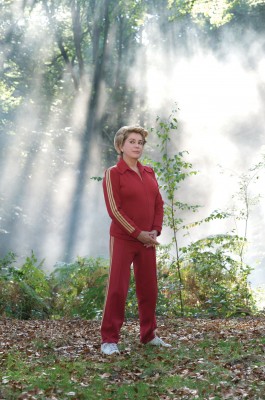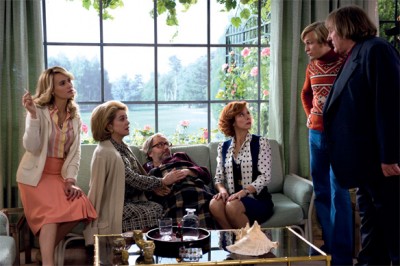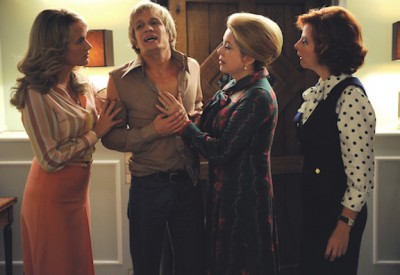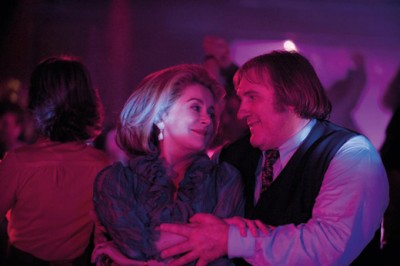| Reviews & Columns |
|
Reviews DVD TV on DVD Blu-ray 4K UHD International DVDs In Theaters Reviews by Studio Video Games Features Collector Series DVDs Easter Egg Database Interviews DVD Talk Radio Feature Articles Columns Anime Talk DVD Savant Horror DVDs The M.O.D. Squad Art House HD Talk Silent DVD
|
DVD Talk Forum |
|
|
| Resources |
|
DVD Price Search Customer Service #'s RCE Info Links |
|
Columns
|
|
|
Potiche

Please Note: The images used here are taken from promotional stills, not from the blu-ray.
Set in provincial France in the late 1970s, and addressing the migration of women from home to workplace and on up through the glass ceiling, Potiche is the second proudly artificial period melodrama-verging-on-musical that French auteur François Ozon has made with Catherine Deneuve in the lead; its predecessor was 2002's delectable, similarly feminism-lite-themed 8 Women, with which Potiche shares its giddily color-coded, satirical, light-as-a-feather nature. But the film harks back even further in Ozon's career, to 2000's Water Drops on Burning Rocks. Like Potiche, that film was an adaptation of a stage play (by the legendary German filmmaker R.W. Fassbinder; Potiche was by Pierre Barillet and Jean-Pierre Grédy), and there is a stylization and structure in each of these films that renders them, for lack of a better word, "theatrical." That is by no means meant as a criticism; a significant part of their pleasure comes from the way Ozon is able to convince us that, despite some old prejudices that posit the theatrical as the very antithesis of the cinematic, the two can actually be surprisingly complementary.
The trick is in finding the right tone, and Ozon has proved, in film after film, to be nothing if not resourceful, skilled, and clever when it comes to tonal matters. He is always very aware of the fact that every detail of the mise-en-scène, from an actor's posture and smallest gestures to the size of the spaces they move in and the color of the walls against which they're foregrounded, is what cumulatively sets the tone. He has shown he can do cerebrally soul-searching (Under the Sand, 5x2, Time to Leave), psychosexually suspenseful (Swimming Pool, See the Sea), or vivacious, sensationalistic, surface-obsessed near-farce, as he did in his early film Sitcom, in 8 Women, and now pulls off (for the most part) once again here, with more focus on the vivacity than the sensationalism. Ozon's strategy is to give us, at every turn, something cinematic that matches and buoys the artificiality of the script; his goal is to remain firmly on the right side of that all-important line dividing the theatrical from the stagebound.

Thus, when we first meet Mme. Elizabeth Pujol (Deneuve), we are in a moving exterior shot, following her through a somewhat fantastical representation of the "real" world. Elizabeth is starting her day with a jog, traveling a path that winds through an autumnal wood, moving through a natural world that has been made to look, through the efforts of cinematographer Yorick le Saux and art director Katia Wyszkop, like a carefully, wholly designed, impossibly vast studio set. Elizabeth's track suit is redder than red, the leaves on the trees shades of orange and yellow that appear not in nature but in drawings or paintings. When Deneuve stops for a rest and says hello to a sprightly squirrel, a tweeting bird, a gracefully bounding deer, and two happily copulating rabbits, then takes out a little notebook and indulges in her housewifely hobby of dashing off a spontaneous poem when so inspired, Ozon has already fixed her, before the film has even really begun, into a cinematic lineage that would include Kathleen Turner's Beverly Sutphin in John Waters's Serial Mom, Penelope Cruz's Raimunda in Almodovar's Volver, and even Disney's Sleeping Beauty. Those films could not have less in common, story-wise, with each other or with Potiche, but they noticeably share two salient factors: an exquisite sense of their own artificiality, and a central female character who is a heroine by dint of her extraordinary, even eccentric awareness of and passionate sensitivity to the world around her, in contrast with the benign ignorance or malicious boorishness of the other characters.
Ignorant and boorish are exactly what Elizabeth's husband, Robert (Fabrice Luchini), is; and the impossibly bourgeois home she keeps for him is a luxurious, garden-enveloped domestic prison (again, the anti-realistic art direction is superb). Robert married his way into his late father-in-law's business, an umbrella manufacturing concern (a reference, perhaps, to Deneuve's famous role in Umbrellas of Cherbourg, a film not entirely dissimilar to Potiche) and now runs it with an iron fist, keeping his wife wrapped up in merely decorative domesticity while he wages class war on his workers, who have had the gall to threaten to strike if their boss fails to meet their demands for such luxuries as higher wages, paid vacations, and new toilets. On the offspring front, the Pujols' feathered-haired daughter, Joelle (Judith Godrèche) takes a bit more after her dad and his mistrust of unionists and commies, while their modishly dressed, rather flamboyant, probably not actually heterosexual son, Laurent (Jérémie Rénier, L'Enfant)--home for a break from university in Paris--is more sensitive, like his mother, and is considering abandoning political science for the arts.

The impending strike gets out of hand; local Communist politician, die-hard unionist, and onetime momentary adulterous paramour of Elizabeth, Maurice Babin (Gerard Depardieu)--who may or may not be Laurent's real father--becomes involved; and Robert's heart condition is so exacerbated by the tumultuousness of events that he is laid up and forced to temporarily delegate his authority to Elizabeth. When Elizabeth, as la patronne, turns out to be fairer, more competent, and much more popular than le patron--pulling Joelle and Laurent into the family business and even winning over her rival, Robert's mistress/secretary, Nadège (Karin Viard)--the stage is set for both a showdown in the battle of the sexes with Elizabeth vs. Robert, as well as for the transformation of Elizabeth from a bored, depressed upper-class housewife into a businesswoman, political dynamo, and pinnacle of a love triangle from the base of which Robert and Maurice both gaze up at her longingly.
When he has Potiche running on all cylinders, which is most of the time, Ozon whips all of this into a satisfyingly frothy mixture. The synthetic, brightly colored fashions (done to loving perfection by costume designer Pascaline Chavanne) and head-turning hairstyles of the period contribute to the film's heightened reality just by being what they are. Potiche's attitude toward the trappings of its era is obsessively detailed and affectionately mocking, with a little of the that's-just-how-it-was of The Ice Storm and a lot of the isn't-it-amazing-that-that's-how-it-was of Boogie Nights. Historical accuracy is much less important to Potiche than to either of those two films, though; at its best, it is purely a helium-filled fantasy with some loose connection to actual gender- and class-based strife and struggle, and what we are seeing announces itself at every turn as a culturally filtered movie-idea of the 70s, far removed from anything like the real thing. Similarly, the umbrella factory, where beautiful, unbelievably hyper-designed umbrellas are "manufactured," is really just a graphically pleasing, cinematic idea of a "factory"; the film does flirt with politics, but it is hardly Godard's Tout va bien, and we do not see any actual work being done.

The bubbles do go a little flat, however, during those occasional lulls where the material does not provide the camera or the decor enough opportunity to disguise the story's ultimate banality; the script is a thin wire meant to support a lot of glorious production flair and boldly "dramatic" characterizations, and it loses some of its momentum when you can see through to the rather plain vanilla cake underneath the layers and layers of pink frosting that Ozon and Co. have carefully applied. This is especially evident in the film's feel-good final scene, which is pretty and pleasant enough, but seems somehow too heavy, as if we are meant to feel the happy ending more deeply than could reasonably be expected from a film so forthrightly dedicated to achieving a sparkly fizziness. At these moments, Potiche is demoted from delectable bonbon to a sort of affirmative, right-thinking but not really very bold p.c. cartoon--a significant step down from the giddy, gauzy heights it more often occupies, where the air is too pleasantly, woozily thin to get too concerned about the harmlessness and inconsequentiality of it all. Fortunately, these downshifts never last too long, and Potiche far more often retains its carefully designed power to sweep us along in its breezy, fleeting wake.
THE BLU-RAY:
The 1080p high-definition, 1.85:1 anamorphic transfer of Potiche is stunning. This is a film for which vivid color, carefully designed lighting, and the minutae of camera framing and movement, are the raison d'être, which is acknowledged by the disc's every carefully mastered frame. Potiche was made principally to be pleasurable to look at, and this transfer is eminently respectful of that.
Sound:
The DTS-HD Master Audio soundtrack is, as usual for the format, lovely to listen to. The sound is full, capturing every nuance of the dialogue and sound effects. The sound mix's perfect balance from every angle is especially notable during the film's several extended quasi-musical moments. The English subtitles are fairly complete and accurately translated.
Extras:The juiciest extra on the blu-ray is an hourlong, vérité-style behind-the-scenes making-of that gives us not only an unusually privileged look at the personalities and interactions of the stars, director, and crew (this is not your typical, airbrushed, marketing-department "featurette") but also an absorbing primer on all the workaday stuff--blocking, lighting, rehearsal--that makes the magic happen.
There is also a short, cute costume test reel and two trailers for the film, one for its U.S. theatrical release, the other the original French preview (which, unsurprisingly, better captures the film's spirit).
FINAL THOUGHTS:A frothy, delightfully artificial, intentionally slight and affectionate look back at women's lib when it was still called that, starring both the grande dame (Catherine Deneuve) and the perennial stalwart (Gerard Depardieu) of French cinema, Potiche only fails to please when it gets lost in a temporary limbo where it becomes too straight-faced, momentarily seeming to doubt itself and the worthiness of its aestheticized, confectionary approach. Most of the time, though, it's just pretty to look at and fun to watch, which are two rare-enough accomplishments. Like a candy that melts sweetly away in your mouth, Potiche isn't all that nourishing and doesn't leave too much of a lasting impression, but for as long as it lasts, it is really delicious. Recommended.
|
| Popular Reviews |
| Sponsored Links |
|
|
| Sponsored Links |
|
|
| Release List | Reviews | Shop | Newsletter | Forum | DVD Giveaways | Blu-Ray | Advertise |
|
Copyright 2024 DVDTalk.com All Rights Reserved. Legal Info, Privacy Policy, Terms of Use,
Manage Preferences,
Your Privacy Choices | |||||||














